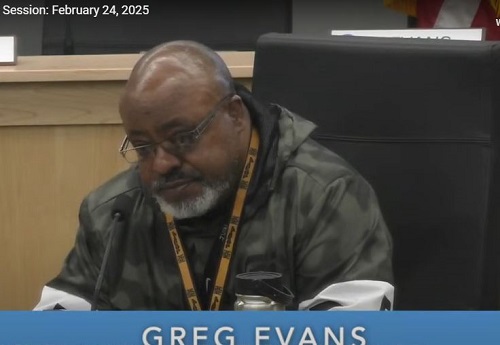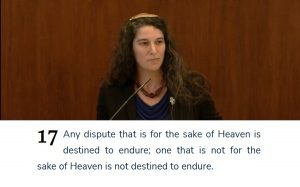Councilor Greg Evans: ‘We need to look at creative ways to deliver services in the future’
8 min read
Presenter: Although divided over the fire fee, Eugene City councilors were unanimous about one thing: taking a long-term look at the budget. On Feb. 10, Councilor Greg Evans:
Councilor Greg Evans: I have one more motion. And that would be to move to direct the city manager to prepare a council retreat on long-term budget stabilization strategies…
[00:00:24] I go back to when I came on Council in 2013 and Councilor Zelenka and Councilor Clark were here at that time. And we were hit with a city service fee at that time to close a lot of these gaps. And what we did instead over the last 12 years was progressively cut, cut, cut, cut, cut to the point that we’re at now.
[00:00:48] And what we really need, and what I suggested to the mayor and the council vice president earlier today was a longer, more in-depth conversation about how we stabilize our budget over the long haul, maybe 10 to 15 years, and look at prioritization of the services that we can and should deliver, and we’re supposed to deliver by charter, and those that maybe we can deliver in a different way if we work with some of our partners like Lane County and Springfield to deliver the same services in a more comprehensive and collaborative way.
[00:01:34] Whether they participate with us or not is another question but I think that we really need to have those kinds of conversations, because human rights goes across the board. It’s all over the county. It’s not just the city of Eugene. People have human rights issues in Springfield, in Junction City, in Cottage Grove.
[00:01:57] We have other things in terms of parks where we may be able to do some creative things. We already have River Road Parks District that is suffering from a revenue drain because as people annex into the city, they go out of the park, out of River Road Parks District and come into the city’s park districts.
[00:02:21] So I think that we need to look at creative ways to deliver services in the future that do not put an extensive burden on what we are doing as a city from a priority aspect.
[00:02:37] Presenter: That was Councilor Greg Evans Feb. 10. He expanded on those ideas in a phone interview Feb. 24:
[00:02:45] Councilor Greg Evans: The council did vote at my encouragement to have a council retreat on long-term stabilization of the budget and prioritization. I made that motion the same night that we voted on the fire fee. We haven’t set a date for it yet, but there will be a retreat. We voted 8-0 to do that.
[00:03:10] You know, I used to be on the board of directors for National League of Cities, and I’ve talked to some of my colleagues across the country—Minnesota, Maryland, Texas, other states, and here in Oregon, too. As municipalities, we are not in a position to be able to address all of the issues that we have addressed to date.
[00:03:38] Basically because we don’t know what’s going to happen with the federal government in terms of what would be funded, what will not be funded; the same thing at the state level. So we’re going to have to look at doing things differently.
[00:03:54] And that means that there are some things that we are not going to be able to do because we don’t have the money or resources to do it. And we don’t necessarily have firm support for the federal or state level to address these issues.
[00:04:13] So we’re going to have to address them in more creative ways than what we have to date, and that requires us to have cross-jurisdictional conversations with our local partners in the various cities in Lane County and our partners at Lane County and Lane County government.
[00:04:35] We are still in the process of consolidating our fire services across the Eugene Springfield Fire Department. We have yet to complete that consolidation. We can probably do something in terms of consolidation in terms of park services and other services in those realms that we may be able to do a little more easily than we can in some other areas.
[00:05:04] So I’m suggesting that we put everything on the table and look at how we can consolidate service and service delivery across the spectrum of our local jurisdictional partners.
[00:05:21] Presenter: We asked Councilor Evans why previous attempts at cooperation and consolidation failed.
[00:05:27] Councilor Greg Evans: Because we have ego problems. That’s why. I mean, let’s just be candid, you know, certain jurisdictions don’t want to give up authority.
[00:05:37] But we are in a chronic situation with our budgets. This is beyond crisis level. Crisis means a temporary situation. The only thing that we can do may be consolidation of services and looking at other ways that we can save money and arrest uncontrolled and rampant inflation across the board.
[00:06:04] We have a metro area of around 250,000 people and we really need to look at how we deliver services on a metropolitan basis, what we’re doing with that, and being able to address it. Because again, the county is going to be looking for money and more money and more resources to address their public safety issues.
[00:06:32] We’re all in the same boat and we’re struggling. We are in a lifeboat situation. We need to figure out how we’re going to survive, one, and two, how we’re going to get back on terra firma.
[00:06:48] So we have to look at these things from the perspective of: Is it going to save the taxpayers money? That’s first and foremost. And then we have to go through the complicated process of merging functions and service delivery functions across jurisdictions.
[00:07:10] And how do we do that? Do we do that with intergovernmental agreements? Do we do it with a merger agreement? I don’t know yet, but it’s something that we need to work with staff—with all the staffs—to figure out how we do that and move forward.
[00:07:26] Other municipalities in the state have gone to special districts. They have saved a lot in administrative costs and other costs and been able to maximize service delivery out of there. Now, are there problems with that model? Yes, there are problems with that model. Part of it is tax compression issues from Ballot Measure 5 and Ballot Measure 50. So we have to figure out the compression issues based on what state law is now.
[00:07:59] So the bottom line, John, we need to figure out how do we save taxpayers money, not costing more money, because inflation is killing us.
[00:08:09] People are going to get hit with more costs of service and taxes and fees over the next few years. And a lot of this for a lot of people will not be sustainable. We’re looking at an increase with EWEB in terms of their fees. We’re going to probably look at an increase with NW Natural gas, we’re coming back to the voters in 2027 to renew the payroll tax for the CSI (community safety initiative).
[00:08:44] So there’s a lot of stuff that we need to figure out and have conversations over. I don’t see this as being a one-off retreat or conversation. We may have to have three or four retreats over the next few months.
[00:09:01] But again, we need to revisit all of this comprehensively and having conversations with everybody in the same room, and we can hopefully agree to working together collaboratively and congenially, to solve our common problem, which is budget, budget, budget, revenue, revenue, revenue.
[00:09:32] Presenter: The city may want to schedule that discussion sooner rather than later. A Feb. 24 presentation by the downtown public safety team was overshadowed by the start of signature gathering to force a public vote on the city’s new $10 million fee. Councilor Alan Zelenka:
[00:09:50] Councilor Alan Zelenka: I thank you for all the hard work and we’re on the right track, but we still need a ways to go. City Manager, what portion of what we’ve just described was identified in the $11.5 million in cuts that Councilor Groves, Clark and Evans voted to make and would be slated to go away?
[00:10:09] Presenter: City Attorney Kathryn Brotherton:
[00:10:12] Kathryn Brotherton (Eugene, city attorney): …That is now an election measure, which puts us in a tough spot. So … that’s what we’re going to need to steer away from, because of Oregon elections law.
[00:10:20] Presenter: Councilor Zelenka changed his question to a statement.
[00:10:24] Councilor Alan Zelenka: The alternative response coordination team, that would go away. The positions that directly deal with homelessness downtown are redirected and half of the neighborhood service officers were on the list as well. And maintenance and the rapid response cleanup crews are all on the list.
[00:10:45] So all of those services that make all the stuff that’s been happening would go away if the fire fee doesn’t go forward. And so all of those services were cuts that Councilors Groves, Clark and Evans put forward as to make cuts doing this stuff.
[00:11:04] Mayor Kaarin Knudson: Councilor Zelenka—
[00:11:05] Councilor Alan Zelenka: It goes against this, what we’re trying to do in the downtown services.
[00:11:09] Presenter: Councilor Mike Clark:
[00:11:11] Councilor Mike Clark: I’ll just say to my friend, Councilor Zelenka, that we didn’t vote on any cuts yet. The three of us you mentioned… we were making the good and responsible decision. We didn’t decide on any cuts yet, so I suppose that was untrue.
[00:11:26] Presenter: Later in the meeting, in response to a question about funding budgeted for CAHOOTS, City Manager Sarah Medary:
[00:11:34] City Manager Sarah Medary: And I just want to clarify, there is not a proposed budget yet. We haven’t completed it.
[00:11:37] Presenter: Councilor Alan Zelenka:
[00:11:39] Councilor Alan Zelenka: Let’s be clear. If the council had voted no on the fire fee, the city manager would have had to proceed to make those deep cuts in services in the budget. So in essence, it was a clear binary choice to make the cuts or not to make the cuts. It’s hard to walk away from that vote with semantics. That’s what happened.
[00:11:59] The point I was making is that while we still have a long way to go, the great work that you guys are all doing, would go away if those cuts, $11.5 million cuts were made. So people need to connect the dots. The progress we’re making is directly related to some of those things. So in my opinion these cuts would set back further progress and probably reverse the progress that we made downtown.
[00:12:23] Presenter: Councilor Mike Clark:
[00:12:25] Councilor Mike Clark: I’ll just repeat the manager because she just said it a minute ago: She hasn’t proposed the budget. No cuts were made. We haven’t decided as a body which particular things other than to say we don’t want to add a tax for new revenue. That’s what the three of us voted on because we’d rather look at other things other than what these fine folks are talking about to cut. We didn’t decide on what any of those were.
[00:12:55] I suspect we will now, because while we had the choice to convince the general public that this fire fee was a good idea, we elected not to do that. And now, as I predicted, the public will force that decision for us.
[00:13:12] Presenter: The city council voted unanimously Feb. 10 to hold a budget retreat. Councilor Greg Evans hopes it will be the first of several to set priorities, and to start collaborating with Springfield and Lane County to save taxpayers money.




